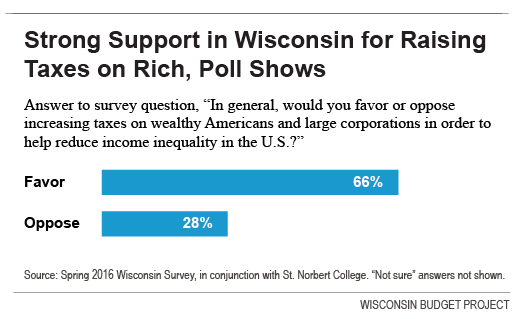State Voters Support Taxing Wealthy More
66% of survey respondents do. But Legislature has lowered taxes on the rich.
Wisconsin residents strongly favor raising taxes on the wealthy and large corporations to reduce income inequality, a new poll shows. But instead of raising taxes on these groups, Wisconsin lawmakers have taken steps to give significant tax breaks to taxpayers with high incomes and corporations.
Two-thirds (66%) of survey respondents support raising taxes on the rich and big businesses, according to the spring 2016 Wisconsin Survey conducted by the Strategic Research Institute at St. Norbert College. Another 28% of respondents did not support raising taxes, and seven percent weren’t sure.
The poll results show that Wisconsin residents are alarmed about growing levels of income inequality and the widening chasm between the highest earners and everyone else. Wisconsin residents are right to be concerned. The share of income in Wisconsin going to the top 1% has reached its highest level ever, exceeding even levels reached prior to the Great Depression, and has more than doubled over the last 40 years. (For more information on the growing concentration of income in Wisconsin, read our January 2015 publication Pulling Apart 2015: Focus on Wisconsin’s 1%.)
Growing levels of income inequality spell trouble for Wisconsin’s economy. Wisconsin families can’t thrive when income growth is nearly non-existent for everyone except those at the top, and businesses need a strong middle class bolstered by broad-based income growth to generate customers. If nearly all the gains from economic growth benefit only a few, many Wisconsin residents won’t have the resources they need to become the kind of skilled workers our economy needs for the future. That hurts everyone.
In contrast to the well-founded concerns of Wisconsin residents, state lawmakers have worked to cut taxes for the best-off and for corporations in recent years. They have passed several tax breaks since 2011 that tilt our tax system in favor of the wealthy, while making it harder to make the kind of public investments in schools and communities that help Wisconsin thrive. Examples include:
- Nearly eliminating income taxes for manufacturing corporations and other producers: When this tax cut is fully phased in next year, it will give a $285 million income tax break to manufacturing and agricultural businesses, almost wiping out any requirement for them to pay income taxes. No job creation is required to claim the credit; in fact, businesses can benefit from this credit even if they are laying off employees.
- Cutting taxes for large, multi-state corporations: Lawmakers relaxed rules that made it difficult for corporations to shift money between states, allowing those businesses to reduce their taxes by $40 million this year.
- Taxing income earned from work at a higher rate than income earned from investments: Lawmakers passed tax cuts on capital gains income that will grow from $20 million this year to an estimated $99 million annually as the tax cuts are fully phased in over several years. Taxpayers with incomes over $200,000 account for nearly half of all capital gains income excluded from taxes despite only making up 2% of tax filers.
- Rolling back a requirement that well-off taxpayers pay some minimum level of income tax: Lawmakers mostly wiped out the Alternative Minimum Tax, which is aimed at making sure that taxpayers who have large tax savings from deductions and exclusions pay at least a minimum amount of income tax. About three-quarters of the taxpayers subject to the AMT have incomes of $200,000 and higher.
Wisconsin Budget
-
Charting The Racial Disparities In State’s Prisons
 Nov 28th, 2021 by Tamarine Cornelius
Nov 28th, 2021 by Tamarine Cornelius
-
State’s $1 Billion Tax Cut Leaves Out 49% of Taxpayers
 Sep 21st, 2021 by Tamarine Cornelius
Sep 21st, 2021 by Tamarine Cornelius
-
TANF Program Serves a Fraction of Poor Families
 Aug 30th, 2021 by Jon Peacock
Aug 30th, 2021 by Jon Peacock























And let’s not forget decades of GOP “support” for local determination now shown for the sham that it has always been.
Funny, you have never studied the tax structure in this state, damn few wealthy. NY raised taxes where they have lots of wealthy and revenue went down. Rush, trump went to Fl.
Wealthy people are not dumb, takes little to transfer residency to non income tax states. So the grubby grabbers pee off.
WE need to have more 1%ers come to Wisconsin not chase them to Texas, dummmies.
WCD you are 110% wrong, as usual. From today’s NY Times: New Jersey had 207,000 millionaires in 2006. In 2015 they had 237,000 millionaires. So they are not flocking to Florida or other states. Maybe do a little research before you spout off nonsense and lies.
Not to mention NY and CA also added thousands and thousands of millionaires.
Revenue went down, dummies not numbers.